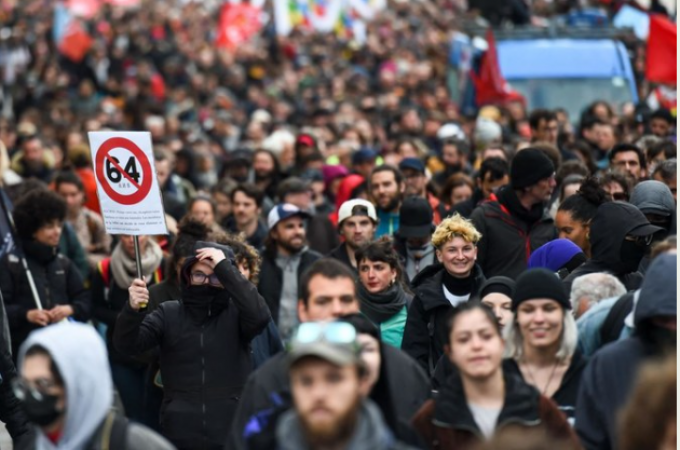
Paris: Despite union requests and three months of demonstrations, French President Emmanuel Macron signed his contentious pension reform into law on Saturday.
After the text was published before dawn in France's official journal, the amendments became law, leading the opposition to claim that Macron was trying to smuggle it through in the dead of night.
The publication came just hours after the Constitutional Council on Friday approved the legislation's essential provisions, including the main change that raised the retirement age from 62 to 64.
Also Read: Lula of Brazil meets Xi in Beijing after criticising the US dollar and IMF
Unions forewarned of large-scale protests planned for May 1 in honour of Labour Day, and after the decision, tense demonstrations broke out in a number of cities overnight.
The fight to put the law into effect ended up being the biggest domestic obstacle of Macron's second term because of both the widespread public opposition to the changes and his own declining personal popularity.
Hard-left MP Francois Ruffin referred to Macron's prompt signing of the law as a "democratic hold-up," while socialist leader Olivier Faure said it revealed Macron's "disdain" for the protest movement.
The leader of the French Communist Party, Fabien Roussel, tweeted, "A law passed like thieves in the middle of the night. "Everyone in the streets on May 1."
The nine-member Constitutional Council determined that the legislation was in accordance with French law and upheld several key reform provisions, including raising the retirement age to 64 and extending the number of years of employment necessary for a full pension.
Six minor proposals were rejected, including the requirement that large corporations disclose the number of over-55 employees they employ and the development of a unique contract for senior employees.
Also Read: No proof that COVID originated from animals, according to the former China CDC director
The publication of the text in France's Official Journal, the official gazette, signifies that it has now become a law.
"Thereby, the Social Security Code is altered. The word "sixty-two" is changed to "sixty-four" in the first paragraph, according to the text, which is referring to the retirement age.
The decision of the constitutional court, however, might only be a partial victory for Macron because, according to analysts, it has cost the 45-year-old man dearly.
The president's approval ratings are close to their lowest points ever, and many voters were outraged by his choice to force the pensions law through parliament without a vote using a legal but debatable mechanism that opponents have criticised as being anti-democratic.
Two out of three French people, according to polls, are opposed to working for another two years.
According to government data, annual pension deficits are projected to reach 13.5 billion euros ($14.8 billion) by 2030. Macron has called the change "necessary" to prevent this.
"Remain on course. That's my guiding principle, Macron declared on Friday as he toured Paris' Notre Dame Cathedral, four years after a devastating fire almost completely destroyed the Gothic structure.
Elisabeth Borne, the prime minister of Norway, stated on Twitter that after the court decision, "there are no winners or losers."
Nevertheless, the left-leaning Liberation newspaper declared in its headline, which was placed above a picture of a demonstration, "Not defeated: opponents of the reform are not going to disarm."
Overnight, trash, e-scooters, and bicycles were set on fire in the capital while large-scale demonstrations rocked other cities like Marseille and Toulouse.
Protesters burned down the entrances to a police station and a conference centre in Rennes, a city in western France. At 10:30 p.m. (2030 GMT), 112 people, according to Paris police, had been taken into custody.
A presidential source told AFP that Macron, who has only made the rarest public comments on the crisis, will address the French early next week.
After three months of strikes and demonstrations, it is still unclear whether the trade unions' months-long attempt to thwart the changes will succeed.
In a joint statement, the unions urged Macron not to sign the bill into law, claiming that the matter was "not finished."
On May 1, Sophie Binet, the general secretary of the CGT union, urged a "popular and historic tidal wave" of people to take to the streets and protest the reforms.
Also Read: European spacecraft takes off Towards Jupiter and its icy moons
On Tuesday, unions rejected Macron's invitation to a meeting, stating that they would only convene after May 1. Following a strike by Paris garbage workers last month, 10,000 tonnes of refuse went uncollected, littering the city.
The court rejected an attempt by opposition lawmakers to force a referendum on a different pension law that would have kept the retirement age at 62 in a second decision on Friday. The majority of France's European neighbours have raised the retirement age to 65 or higher, while France lags behind. The right to a lengthy retirement is allegedly undermined by the changes, which opponents claim penalise women and unskilled workers who began their careers early.